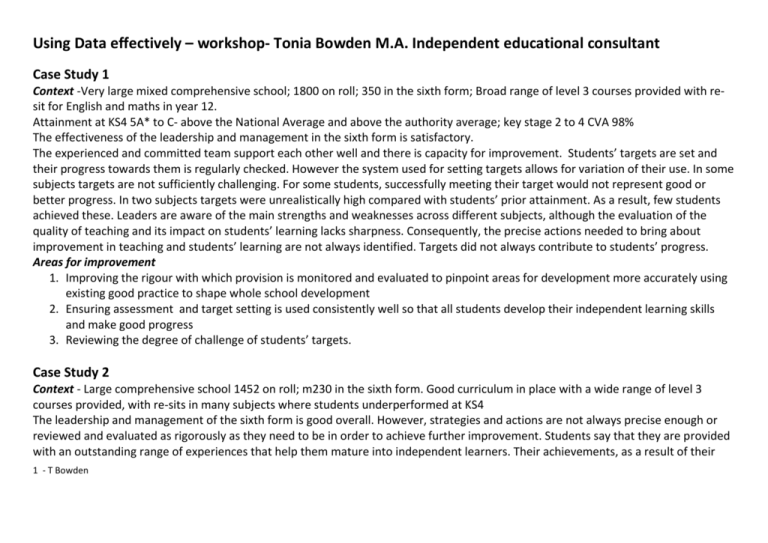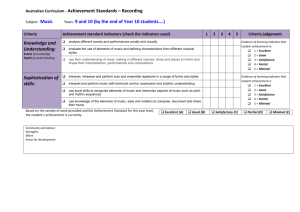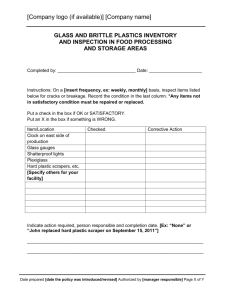Using Data effectively – workshop
advertisement

Using Data effectively – workshop- Tonia Bowden M.A. Independent educational consultant Case Study 1 Context -Very large mixed comprehensive school; 1800 on roll; 350 in the sixth form; Broad range of level 3 courses provided with resit for English and maths in year 12. Attainment at KS4 5A* to C- above the National Average and above the authority average; key stage 2 to 4 CVA 98% The effectiveness of the leadership and management in the sixth form is satisfactory. The experienced and committed team support each other well and there is capacity for improvement. Students’ targets are set and their progress towards them is regularly checked. However the system used for setting targets allows for variation of their use. In some subjects targets are not sufficiently challenging. For some students, successfully meeting their target would not represent good or better progress. In two subjects targets were unrealistically high compared with students’ prior attainment. As a result, few students achieved these. Leaders are aware of the main strengths and weaknesses across different subjects, although the evaluation of the quality of teaching and its impact on students’ learning lacks sharpness. Consequently, the precise actions needed to bring about improvement in teaching and students’ learning are not always identified. Targets did not always contribute to students’ progress. Areas for improvement 1. Improving the rigour with which provision is monitored and evaluated to pinpoint areas for development more accurately using existing good practice to shape whole school development 2. Ensuring assessment and target setting is used consistently well so that all students develop their independent learning skills and make good progress 3. Reviewing the degree of challenge of students’ targets. Case Study 2 Context - Large comprehensive school 1452 on roll; m230 in the sixth form. Good curriculum in place with a wide range of level 3 courses provided, with re-sits in many subjects where students underperformed at KS4 The leadership and management of the sixth form is good overall. However, strategies and actions are not always precise enough or reviewed and evaluated as rigorously as they need to be in order to achieve further improvement. Students say that they are provided with an outstanding range of experiences that help them mature into independent learners. Their achievements, as a result of their 1 - T Bowden time in the sixth form, are, for some students 'beyond anything they ever dreamed possible'. Outcomes at the end of Year 13 support this view. Examination results and the school's own data indicate that students consistently make good progress overall taking into account their individual starting points. Their attendance is high. A much higher proportion of students than is found nationally continue to study four subjects at A level, when they move from Year 12 into Year 13. In one subject progress is outstanding, in two progress is satisfactory, in all other subjects progress is good. The support students receive both in terms of their academic guidance and their personal development is also good. This enables them to make suitable choices and consequently the proportion of students progressing into further learning or employment is high. Students in the sixth form play an active role in decision making and in the life of the school and local community, for example, through fund raising for local charities, mentoring younger students and acting as coaching leaders in local schools. The majority of teaching observed by inspectors in the sixth form was good with some outstanding. Areas for improvement Case study 2: 1. Improving the rigour with which provision is monitored to reflect the processes used at KS3 and 4 2. Ensuring target setting is used consistently well so that all students are set challenging and achievable targets 3. Reviewing the degree of challenge of students’ targets in underperforming subjects. Case Study 3 Context -Smaller than average size comprehensive school; 790 on roll, 51 in the sixth form; A good range of level 3 courses in partnership with the local college provided with re-sit for English and maths in years 12,13 and 14. Attainment at KS4- 5A* to C is below the National Average and below the authority average; key stage 2 to 4 CVA 97%; Higher than average SEN, 54% English as a second language learners The effectiveness of the leadership and management in the sixth form is satisfactory. There is currently a temporary leader of the sixth form who has carried out a comprehensive review in partnership with a small team from the local college. They have begun to tackle underperformance in teaching and learning. There is good capacity for improvement. Students say that they are provided with good continuing support for the development of English as a second language which takes account of the need to sit exams in English. They appreciate the policy for always being entered for higher study in their home language. Many say they would not go to college if they did not have the security of links with the school. Their achievements as a result of their time in the sixth form are, for all students, satisfactory and for English as a second language students, are good. 2 - T Bowden Outcomes at the end of Year 13 support this view. Examination results and the school's own data indicate that students consistently make satisfactory progress overall taking into account their individual starting points. Their attendance can be an issue as many are absent as they assist parents and other family members by acting as interpreters in matters of business and health. As such the independent learning platform is used well in the school with all lessons and support materials made available for home use. In home language subjects progress is outstanding in two languages. Progress is satisfactory in all other subjects except one where there have been serious staffing issues. The support students receive both in terms of their academic guidance and their personal development is satisfactory. The proportion of students progressing into further learning is low; for employment it is higher for some cohorts of established minority groups. Students in the sixth form play an active role in mentoring students at KS3 and 4 in the development of English as a second language and they actively support the ‘new to the school’ social integration programme which has an outstanding element of developing tolerance and understanding of different cultures. Areas for improvement 1. Embedding the newly designed self-review system devised by the working part in partnership with the local college into all areas of both school and college, following the pilot. 2. Reviewing the use of the new attainment and progress tracking system to ensure it takes account of accredited and nonaccredited targets. 3. Embedding the new attainment and progress tracking system that allows learners to monitor and compare their progress against an attainment plan 4. Ensuring underperformance is managed to improve all learning to at least satisfactory and satisfactory learning to good. Some starting points for actions Do systems for self-review have the impact needed to ensure, Effective support for learners to monitor and compare the progress they are making against a personalised plan? That the schools/college is monitoring when a learner falls behind? That strategies are in place to support slow or underperforming learners? Does a personalised plan take account of accredited and non-accredited targets?/ Is the level of challenge of targets right? Choose a case study and one area for development and in pairs discuss what actions might be the most effective providing the greatest impact on raising leadership from satisfactory to good or good to outstanding. 3 - T Bowden Work shop activity Improvement Plan – post 16 Use of Data to raise standards of achievement and progress to good or better. Please circle case study 1 2 3 - Area for development please circle 1 – 2 – 3 Action to be taken Time scales Cost Using Data effectively – workshop Tonia Bowden. June 2011 copyright 4 - T Bowden Lead/team Success Criteria Monitoring







